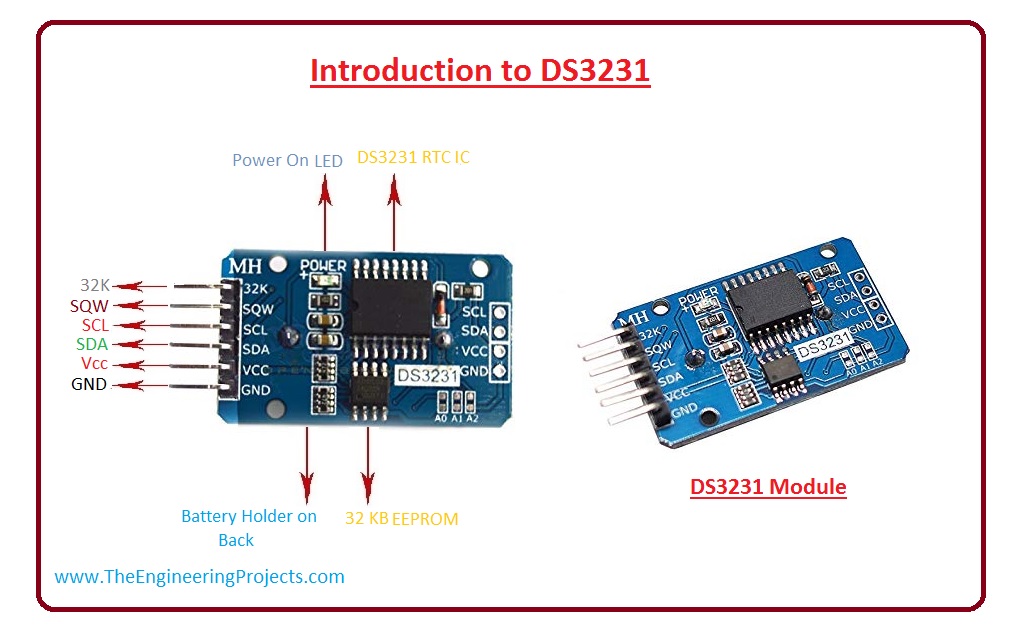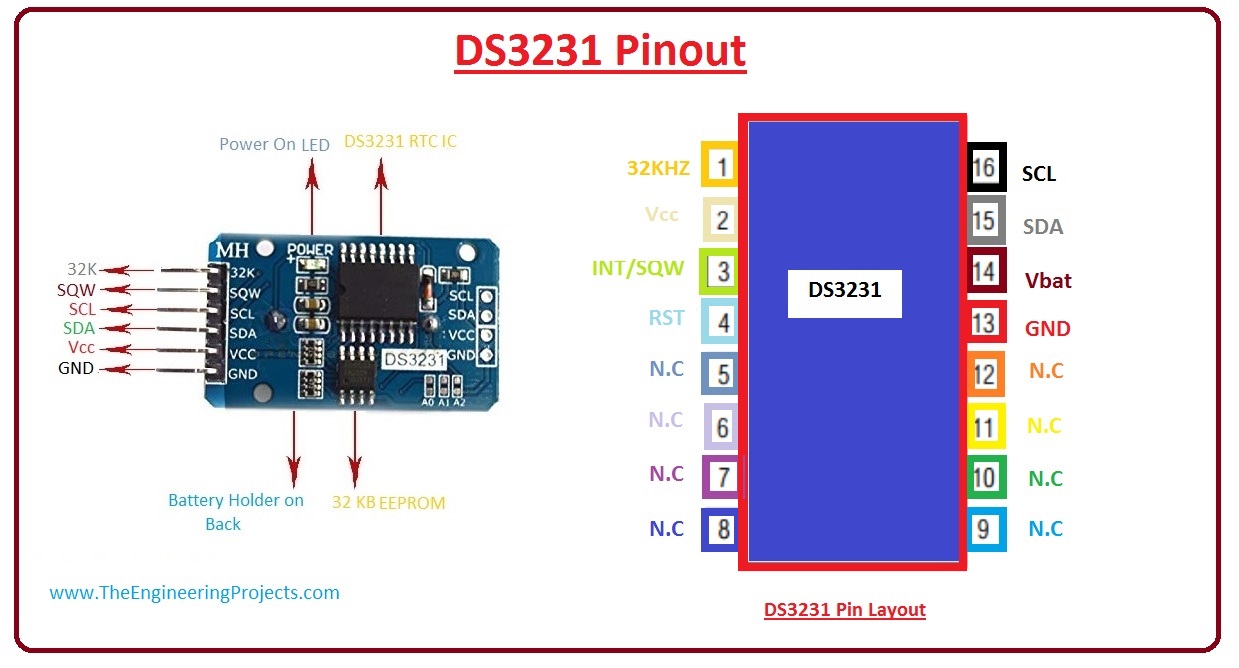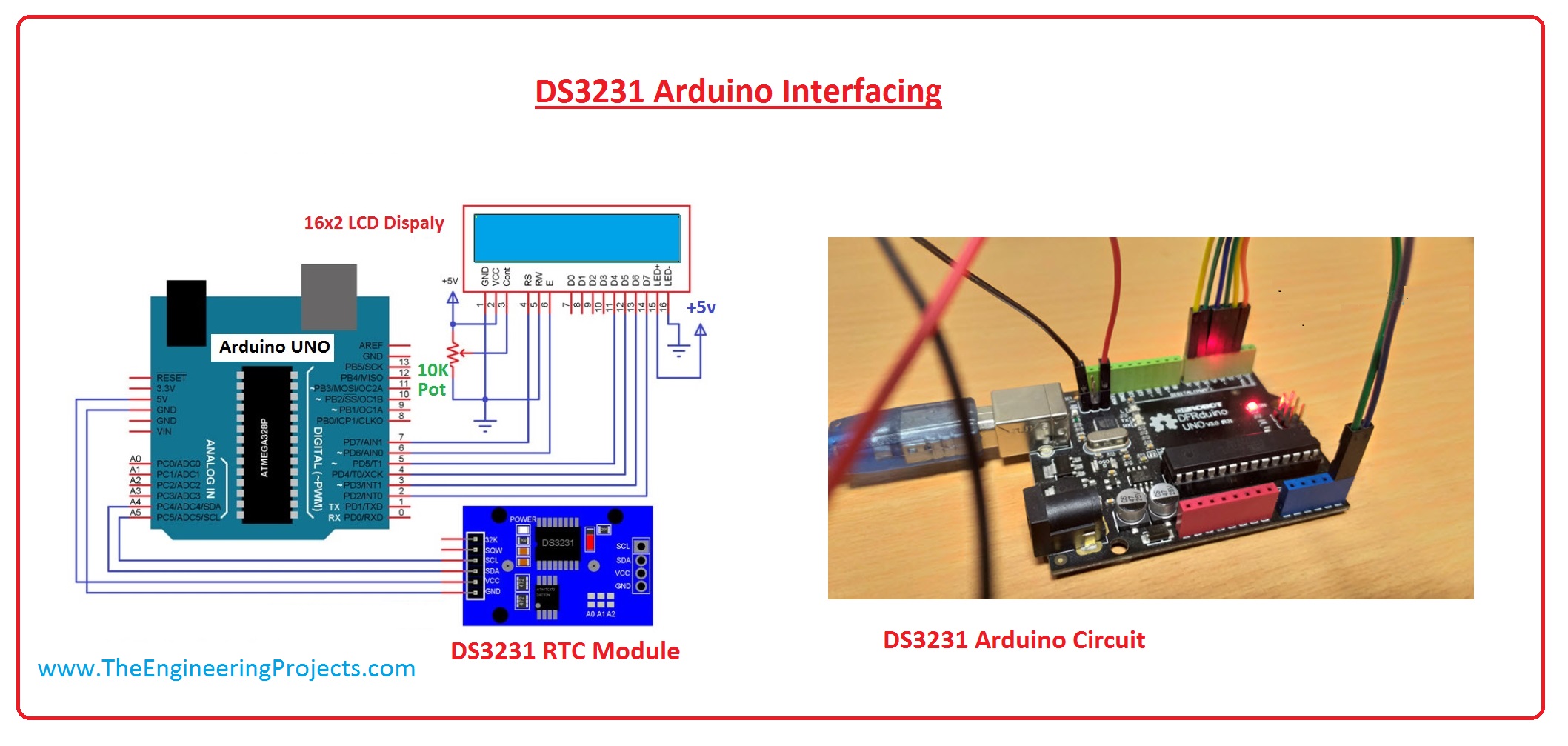
Introduction to DS3231
- DS3231 is a low-cost real-time clock (RTC), which has an integrated temperature-compensated crystal oscillator (TCXO) and I2C working protocol. It also has a backup battery, which provides supply when the main supply is cut off.
- It has a crystal resonator which enhances the long-term accuracy of the device and reduces piece-part count in a manufacturing line.
- It is available in 16 pins, 300 mil SO package. This RTC module maintains seconds, minutes, hours, dates, months and yearly information. It changes to date and time at the end of the month automatically including corrections for the leap year.
- This module operates in either 24 24-hour or 12-hour format with an AM/PM indicator.
- It consists of temperature compensated voltage reference and comparator circuit, which monitors the status of Vcc to detect power failures. This circuit provides a reset output and automatically switches to a backup supply when necessary.

DS3231 Pinout & Description
There are a main sixteen pinouts of DS3231, which are described below with detailed.| Pin# | Type | Parameters |
| Pin#1 | 32K | This is a 32 kHz output. This is an open drain pin requires an external pull up resistor. If it is not in use can be left open. |
| Pin#2 | Vcc | This pin is for DC power supply. It should be decoupled with 0.1µF to 1.0µF capacitor. If not in use connected to ground. |
| Pin#3 | INT/SQW | This is a low interrupt or square wave output pin. It requires an external pull up resistor. |
| Pin#4 | RST | This is an active low reset. It is open drain input/output. It indicates the status of Vcc relative to the Vpf simplifications. As Vcc falls below Vpf, the RST pin is driven low. |
| Pin#5-12 | N.C | These pins are not in use. These should be connected to ground. |
| Pin#13 | GND | This pin is used for ground. |
| Pin#14 | Vbat | This pin used for Backup Power Supply Input. It should be coupled with 0.1µF to 1.0µF low-leakage capacitor. |
| Pin#15 | SDA | It is serial data input, output pin. This pin is the data input/output for the I2C serial interface. |
| Pin#16 | SCL | It is a serial clock pin. |

Features of DS3231
- Features of an electronic component can help you a better understanding of major function associated with it. It will help you to make a final decision before picking a device for your relevant project. Following are some features of DS3231.
- Its accuracy from 0°C to +40°C is ±2 ppm and -40°C to +85°C is ±3.5 ppm.
- It is a low power consumption device. It has battery backup for continuous timekeeping.
- Its temperature range for commercial use is 0°C to +70°C and for industries is -40°C to +85°C.
- This Real Time Clock Counts Seconds, Minutes, Hours, Day, Date, Month, and Year with Leap Year Compensation Valid Up to 2100.
- It has two times of day alarms. It can operate up to 400kHz frequency.
- It has a simple serial interface which can Connect to Most Microcontrollers. Its working protocol is I2C.
- It is Underwriters Laboratories (UL) Recognized.
DS3231 Arduino Interfacing
Friends, now we discuss DS3231 Arduino interfacing with a complete description and circuit diagram. Components Required- These are components of this circuit.
- Arduino UNO
- DS3231 RTC Module
- Mini Breadboard
- 16×2 LCD Display
- Connecting Wires
- 10 KO POT
- First of all, we discuss connections between Arduino and DS3231. As we already know interfacing between them is I2C, If you are using board other than UNO, then first you should identify the I2C pins on your Arduino Board.
- In Arduino UNO A4 and A5 are SDA and SCL pins. Connect these pins with corresponding SCL and SDA pins of DS3231 module. After this connect Vcc and ground pin of RTC Module with +5v and GND of Arduino.
- For output, I have interfaced LCD with this circuit. Connect E and RS pins of LCD to 7 and 6 of Arduino, also connect D4-D7 of LCD to 5-2 of Arduino pins.

Applications of DS3231
- These are some applications of DS3231.
- It is used in Servers.
- It used in Data Loggers
- It can be used in GPS Modules.
- It is also used in Power Meters



